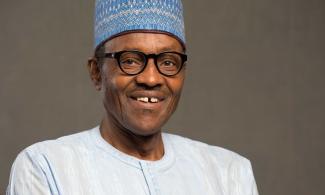
The survey completion period was intentionally delayed, and opened on December 19, 2014 after both major political parties – the People’s Democratic Party (PDP) and the All Progressives Congress (APC) had announced their Vice Presidential candidate selections.
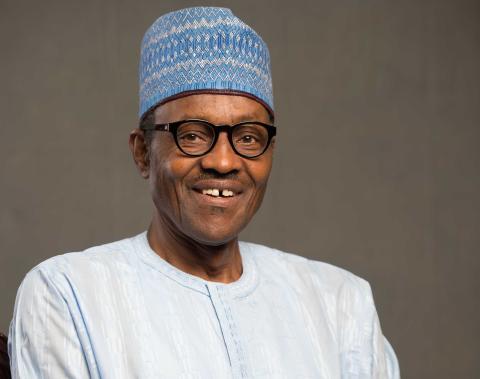
Summary of Results: A comprehensive electoral survey was conducted from December 19th to February 7th. Respondents were sampled using Facebook and electronic mail. Survey Platform was Survey MonkeyTM. A detailed overview of the survey methodology is described at the end of this paper. The survey questionnaire comprised of 42 questions covering the following topics: (a) demographic questions covering gender, educational attainment, income, region of origin, place of domicile and location at which voter’s registration was done (b) 2011 electoral choices (c) 2015 voting intent (d) respondents’ political views and (e) motivating factors for the choice of Presidential candidate.
The survey completion period was intentionally delayed, and opened on December 19, 2014 after both major political parties – the People’s Democratic Party (PDP) and the All Progressives Congress (APC) had announced their Vice Presidential candidate selections. This was done to eliminate any potential bias that could result from the impact that uncertainties about the choice of Vice Presidential candidates would have on respondents’ choice of President.
A critical challenge that an online-based poll offers is the possibility that results can be skewed based on an over-representation of respondents from certain regions. We controlled for this by analyzing the results on a regional basis based on where respondents registered for their voter cards.
Given that the survey allowed us to establish where respondents would be voting, it was possible to develop a detailed profile of voting behavior by region. This allowed us to develop insights into the likely scenarios that will evolve by region, and also enabled us to ensure that a high response in certain parts of the country did not unduly skew the predicted outcomes. Our ability to evaluate voter behavior on a regional basis also allowed us to evaluate the potential impact that low voter turnout or outright vote cancellation in the North Eastern part of the country might have on electoral outcomes. All analyses relevant to the elections were carried out only with respondents that were domiciled in Nigeria and had also indicated that they would be voting in the 2015 elections.
Projected Outcomes
Muhammadu Buhari is on track to win the 2015 Presidential elections with about 21.5 million total votes (see Figure 1), while Goodluck Jonathan will obtain about 18.5 million votes. The combined tally for the two candidates will average about 40 million votes. We assumed that the voter turnout would be about 58.1%, which is the average of the voter turnout percentages obtained in the last 4 elections held in the 4th republic (53.7% in 2011, 57.5% in 2007, 69.1% in 2003 and 52.3% in 1999).
Based on the survey results, we predict that Goodluck Jonathan will win the South East (65%) and South South (71%) geo-political zones, while Muhammadu Buhari will win in the North East (53%), North West (59%), North Central (57%) and South West (75%).
Given the possibility that the lingering Boko Haram crisis in the North East might prevent elections from holding in the states of Borno, Adamawa and Yobe (BAY), we explored the impact that the exclusion of these states would have on electoral outcomes. Our analysis suggests that the complete exclusion of the BAY states from the electoral tally will still result in a victory for Muhammadu Buhari. In the event that voting will not be able to hold in the BAY states (Borno, Adamawa, Yobe), the total expected votes from the North East will reduce from about 5.3 million to 2.6 million votes, and the projected national tally will be 20.1 million votes for Muhammadu Buhari versus about 17.2 million votes for Goodluck Jonathan. In either scenario, Buhari will likely win the presidential elections with about 54% of the total votes cast.
As we earlier indicated, the responses were analyzed based on the region of domicile of the respondents. Without this critical filter, a margin of victory of 62% would have been predicted for Muhammadu Buhari based on the raw data. We reiterate that by analyzing the data based on region of domicile, we were able to better ensure that the potential overrepresentation of certain regions in the respondents’ population did not skew the overall results. It is our view that some of the spot polling data that have provided outsized margins of victory for either of the major candidates, might benefit from filters to ensure that the sample population which the surveys are based on is representative of the regional (or state by state) composition of the country.
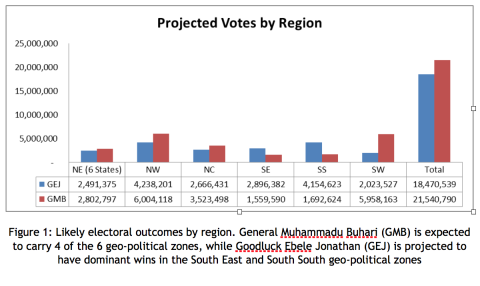
Figure 1: Likely electoral outcomes by region. General Muhammadu Buhari (GMB) is expected to carry 4 of the 6 geo-political zones, while Goodluck Ebele Jonathan (GEJ) is projected to have dominant wins in the South East and South South geo-political zones
The factors that underline why Buhari will likely win
Our analysis suggests that the real story of the 2015 elections will not be so much about the scale of the likely victory in the presidential elections by Buhari, but about Goodluck Jonathan’s catastrophic loss of the 2011 coalition that propelled him to office.
The most crippling statistic for Goodluck Jonathan is that 47% of the respondents who voted for him in 2011 have indicated they will be voting for the opposition candidate, Muhammadu Buhari in the 2015 elections (see Figure 2). In contrast, Muhammadu Buhari will retain a staggering 96% of those who voted for him in 2011 (Figure 3), and further build on his voter tally by taking on the 47% of voters who supported Jonathan in the 2011 elections but have elected to defect to Buhari in the 2015 polls. The disaffection with Jonathan is deep and pervasive. Although 74% of all respondents indicated that they voted for Goodluck Jonathan in 2011, only 36% of respondents either strongly approved or approved of the job that he is doing as president (Figure 4).
When the reasons for candidates preferences are analyzed, the (anti)corruption stance of the candidate, is the primary driver of voter behavior (see Figure 5). This is despite the fact that corruption only ranked 5th amongst the key issues of concern to Nigerians (see Figure 6) – behind issues such as security, economic growth, jobs creation and power. It is not clear to us whether the issue of corruption was conflated by respondents to be an all-encompassing issue that affects other key areas of voter concern. This would be the case if respondents believed that the security challenges and the inability of the Nigerian military to effectively contain the Boko Haram crisis are linked with corruption. Similar sentiments that might blame lax economic growth on corruption and embezzlement of funds, could also potentially explain why corruption is taking on a central role in this electoral cycle. While the underpinning factors that have made corruption the primary driver of the 2015 elections are not very clear, the fact is that majority of voters (42%) are making their choice for president based on the corruption standing of the candidates, with a larger number of them (38% of all voters) selecting Muhammadu Buhari as the clear anti-corruption champion compared to 4% for Jonathan.
In trying to understand the factors responsible for Muhammadu Buhari’s surge in acceptability and favorability, there are two critical demographic insights worth considering and these have to do with religion and gender. While Muhammadu Buhari narrowly leads Jonathan amongst women voters (54% vs 46% - see Figure 7), he holds a dominant 2 to 1 lead amongst male voters (see Figure 7).
In a clear reversal of the 2011 polling results, Muhammadu Buhari also leads Jonathan amongst Christian voters (54% vs 46% for Jonathan – see Figure 8), while he maintains a 72% advantage over Jonathan amongst Muslim respondents (86% vs 14% - see Figure 8). The staggering reversal of fortunes for Jonathan will be better appreciated when the fact is considered that in 2011, he (Jonathan) won 85.5% of the Christian vote and 50% of the Muslim vote.
The survey results clearly demonstrate the remarkable erosion of Jonathan’s support base amongst Christian voters, and the massive decline in his strong showing amongst Muslim voters in 2011. The remarkable turnaround in the fortunes of Mr. Buhari among Christian voters can probably be best explained by the dampening role that Osinbajo’s choice as the Vice Presidential pick and the perceived support that Osinbajo’s candidacy has from Pastor Adeboye, has made on Jonathan’s erstwhile strong standing amongst Christian voters. While this religious vote swing is real, we wish to point out that when we posed the question regarding the impact that the choice of Vice Presidential candidate had on their voting preference, respondents indicated that it was not a strong factor in their decision making (see Figure 5).
When we analyzed the preference data based on the age of respondents, Goodluck Jonathan leads (63%) amongst voters under 24 years of age, while Muhammadu Buhari leads amongst voters 25 years and older (Figure 9) – underscoring the broadness of his appeal.
While the story might seem generally positive for Buhari and the APC, the survey results however reveal some deep issues that voters have with both candidates and parties. Nigerians do not view Buhari or the APC as being particularly strong on the economy and in job creation – which are amongst the top priorities of voters (see Figures 5 and 6). Should our results be validated and Buhari and the APC triumph at the polls, they can expect a short honey moon period, as voters will very quickly begin to expect to see results in the key areas of major concern - ending the Boko Haram insurgency, driving economic growth, tackling unemployment & job creation, and solving the lingering power crisis. Buhari’s mandate – if he wins, will not be to wage a war on corruption to the exclusion of the actual issues that matter to voters. He and his party, will have to deliver on other cogent issues.
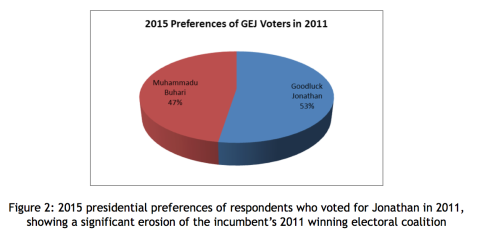
Figure 2: 2015 presidential preferences of respondents who voted for Jonathan in 2011, showing a significant erosion of the incumbent’s 2011 winning electoral coalition
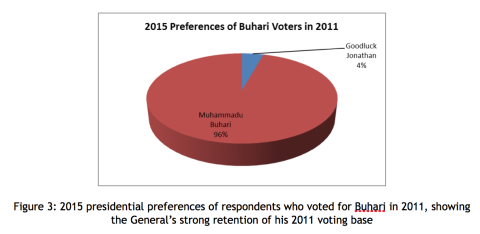
Figure 3: 2015 presidential preferences of respondents who voted for Buhari in 2011, showing the General’s strong retention of his 2011 voting base
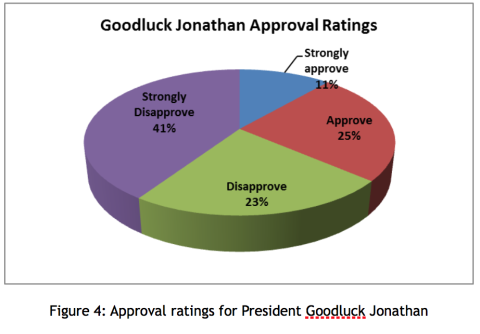
Figure 4: Approval ratings for President Goodluck Jonathan
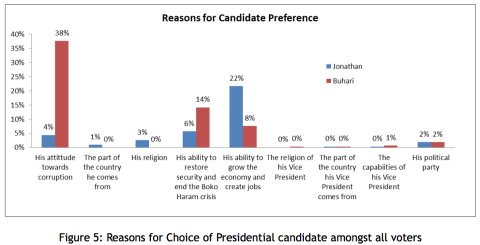
Figure 5: Reasons for Choice of Presidential candidate amongst all voters
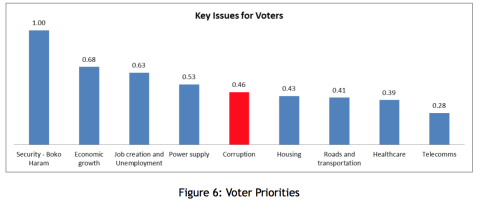
Figure 6: Voter Priorities
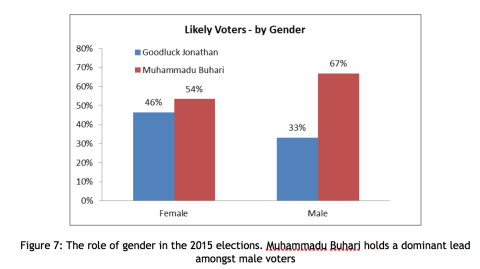
Figure 7: The role of gender in the 2015 elections. Muhammadu Buhari holds a dominant lead amongst male voters
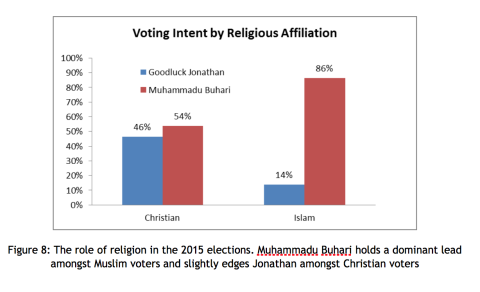
Figure 8: The role of religion in the 2015 elections. Muhammadu Buhari holds a dominant lead amongst Muslim voters and slightly edges Jonathan amongst Christian voters
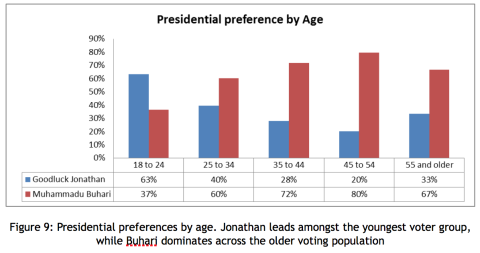
Figure 9: Presidential preferences by age. Jonathan leads amongst the youngest voter group, while Buhari dominates across the older voting population
National Assembly Elections – Why the APC Will Likely Take Over the National Assembly
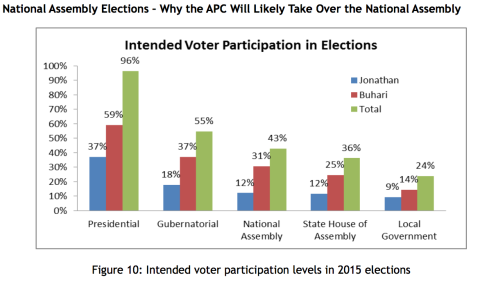
Figure 10: Intended voter participation levels in 2015 elections
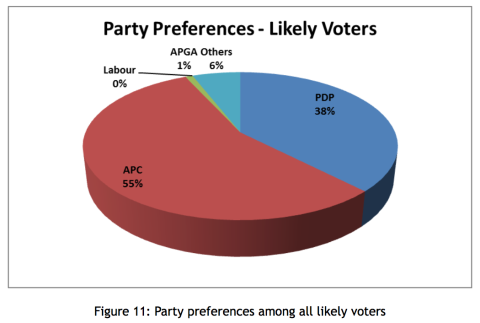
Figure 11: Party preferences among all likely voters
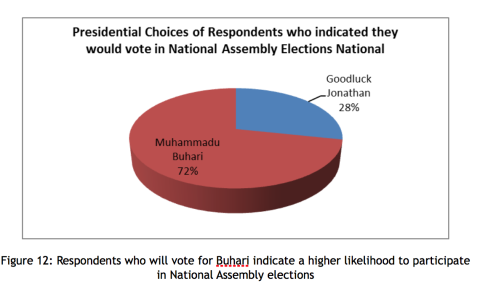
Figure 12: Respondents who will vote for Buhari indicate a higher likelihood to participate in National Assembly elections
While about 96% of likely 2015 voters indicated that they would participate in the Presidential elections (see Figure 10), only 43% stated an intention to participate in the National Assembly elections. However, given that both elections will hold on the same day (formerly February 14th, now March 28th), the expected strong showing of the Presidential candidate of the APC and the broad national sentiment in favor of the APC (see Figure 11), it can be reasonably expected that the APC will sweep the National Assembly elections as well. We do not have any data to predict what the regional breakout of the votes will be.
When we analyzed the data to determine whether the supporters for either candidate intended to vote in the National Assembly elections, the data indicated that 52% of Buhari’s supporters and 33% of Jonathan’s supporters intended to participate in the National Assembly elections. When the total numbers are factored in, about 72% of voters that intend to participate in the National Assembly elections are those who will be voting for Buhari (see Figure 12).
We did not expressly ask respondents which candidates or parties they would be voting for in the National Assembly elections. However, given the stronger intended participation rates of Buhari supporters, the high preference expressed for the APC, and the fact that the elections for the National Assembly will hold alongside the Presidential elections, we predict that the Buhari wave will significantly enhance the chances of the APC in the National Assembly elections. Nigeria will likely see a Presidential and parliamentary sweep by the APC.
Survey Methodology
Facebook respondents were reached using the Facebook Ads features. The target audience was set to Nigerian-based users of Facebook, ages 18 and older. 100,611 unique individuals were reached through this medium, with 2,086 people taking action (click through) which resulted in 401 completed survey responses.
For the electronic mail derived sample population, representative e-mails for Nigerians were collated from various list serves. Mailing list sources were selected to represent a diversity of political views, ethnicities and religious affinities. Solicitation e-mails were sent to 2,025 recipients and 147 completed responses were received.
As at the time of completing the analysis discussed in this paper, a total of 548 complete responses were obtained. Of these, 460 of the respondents were domiciled in Nigeria. 358 Nigeria based respondents indicated that they intended to vote in the 2015 elections and only this subset of likely voters were used in the analysis. Based on the official number of 68.8 million registered voters in Nigeria, this number of intended voters will provide predictive outcomes with an estimated confidence level and interval of 95 ± 5.2%.
Potential Shortcomings of the Survey
As with any online based survey, there is a possibility for bias towards candidates whose supporters might have a broader affinity for technology, or more access to technology due to wealth. We did not find any inherent affinity for Muhammadu Buhari or Goodluck Jonathan in our sample population. Our review of respondents’ polling preferences in the 2011 elections and our region corrected results indicated that 74% of respondents had voted for Goodluck Jonathan in 2011.
Our results will at best underrepresent, and at worst completely fail to capture the prevailing views and sentiments of populations in the various regions who do not have access to electronic mail or the internet. Based on the fact that there is generally less access to these resources in the Northern parts of the country where Muhammadu Buhari has stronger support, there is a reasonable possibility that the projected results we have provided represent the lower bound of the scale of victory that Muhammadu Buhari will likely obtain at the polls.
6 weeks is an eternity in politics, and a lot can still change between now and the rescheduled polling date of March 28th. Our results are valid predictors, only for what might have transpired had the elections proceeded as scheduled on February 14th.
Key observations by the numbers
21.8% of respondents are unemployed, 28.8% are self-employed, while 49.4% indicated that they currently work for an employer
23% of respondents believe Nigerians are united
68% of Nigerians believe that Tribalism is the reason for the lack of unity, while 57% believe that the lack of unity is driven by religious differences
87% of respondents believe Nigeria should remain as a united country
18% of respondents registered to vote in their places of origin
60% believe the 2015 elections will be free and fair
64% of respondents disapprove of the work Jonathan is doing as President
88.2% of respondents have already received their voter cards
33% of respondents earn less than N30,000 per month
Disclosure:
The 2015 National Electoral Poll was not commissioned by any political party, or vested organizations and/or individuals in the Nigerian political process. Dr Malcolm Fabiyi holds a BSc (First class) degree in Chemical Engineering from the University of Lagos, an MBA from the University of Chicago and a PhD in Chemical Engineering from Cambridge University. Dr Adeleke Otunuga holds Bachelors (Philosophy) and Masters Degree (IRPM) from the University of Lagos, and a PhD in Management (Organizational Leadership) from the University of Phoenix. Both authors have previously written public articles in support of Muhammadu Buhari’s candidacy. However, this paper was compiled based exclusively on data received from respondents obtained by random sampling. We commit to providing raw data values from this survey to genuine academically motivated requests. Any inquiries regarding the survey should be directed to [email protected].